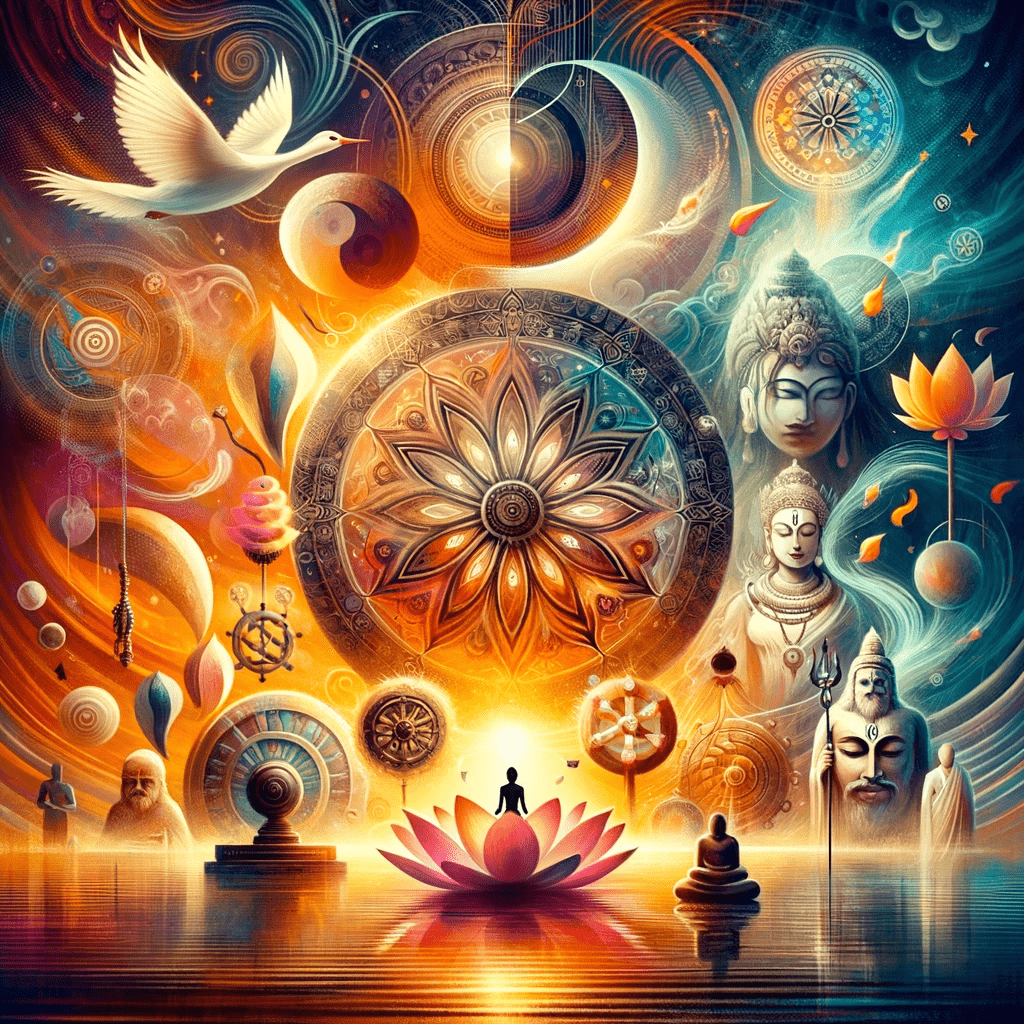Hinduism

Hinduism, one of the oldest religions in the world, is a deeply complex and multidimensional spiritual tradition originating in the Indian subcontinent around 1500-500 BCE, based on the Vedas, the oldest sacred texts of Hinduism. The exact geographical origin is debatable; however, it’s widely accepted that it evolved organically in the areas around the Indus Valley (modern-day Pakistan and Northwestern India). As a way of life that embraces a wide range of beliefs, philosophies, and practices, Hinduism’s expansive nature often defies precise definition, yet it broadly encompasses several shared concepts including Dharma (duty/ethics), Karma (action and consequence), Moksha (liberation from the cycle of rebirth), and a pantheon of deities with Brahma, Vishnu, and Shiva as the central trinity.
At the heart of Hinduism are several key concepts that, though interpreted differently across its numerous sects and schools of thought, form the central pillars of its philosophical structure.
- Dharma: This is a fundamental concept in Hinduism, often translated as duty, righteousness, or ethics. However, it goes beyond these interpretations, representing the moral and ethical duties that individuals must follow to live a virtuous life. It is the code of conduct that one should adhere to, considering one’s class (Varna), occupation (Svadharma), and life-stage (Ashrama).
- Karma: Karma refers to the law of cause and effect. It postulates that every action (physical, verbal, and mental) has corresponding consequences, and these effects may manifest in the current life or subsequent ones. This belief in the moral causality of actions encourages ethical behavior among adherents.
- Moksha: Moksha, often translated as liberation or salvation, is the ultimate goal in Hinduism. It represents liberation from Samsara, the cycle of birth, death, and rebirth. Attaining Moksha implies realizing one’s true self (Atman), transcending worldly desires, and achieving union with the ultimate reality or divine force (Brahman).
- Deities: Hinduism is known for its vast pantheon of gods and goddesses, symbolizing various aspects of life and the universe. While it may appear polytheistic, most Hindus view the multitude of deities as diverse manifestations of a single, ultimate reality (Brahman). The Trimurti, or the holy trinity of Hinduism, includes Brahma (the creator), Vishnu (the preserver), and Shiva (the destroyer), each representing a cosmic function in the universe.
In essence, these concepts and beliefs coalesce to form the philosophical foundation of Hinduism. They provide a moral and spiritual roadmap for Hindus, guiding their interactions with society and their inner spiritual journey.
Contrary to many Western religions, Hinduism doesn’t have a single founder or a centralized religious authority, instead offering its followers a myriad of paths to divine realization, reflecting its pluralistic and inclusive philosophy. The ‘why’ of Hinduism, like any religion, lies in its role as a spiritual and moral guide, shaping cultural, social, and personal values for its followers.
The “science” of Hinduism lies in its profound metaphysical concepts, and it frequently displays a congruence with modern scientific principles. For example, the Hindu concept of the universe’s cyclic creation and destruction aligns remarkably with contemporary theories of a cyclic universe in cosmology. Further, the Upanishads’ and Yoga’s explorations of consciousness resonate with current investigations in cognitive science and neuroscience.
- Hinduism, with over a billion followers, is the world’s third-largest religion after Christianity and Islam, as documented by Pew Research Center.
- The Rigveda, composed between 1500 and 1200 BCE, is among the world’s oldest known religious texts. This fact is widely accepted among historians, including Michael Witzel, a Harvard University Indologist.
- The concept of ‘zero’ and its integration into the place-value system is one of the significant contributions of ancient India, likely influenced by Hindu philosophical concepts of ‘Shunya’ (void or emptiness). This has been verified by various historical mathematic texts, including the works of Brahmagupta.
Experts like Dr. David Frawley, an American Hindu teacher, emphasize that Hinduism, being a conglomerate of diverse beliefs and practices, encourages spiritual exploration and philosophical introspection. Hinduism, according to him, is more of a ‘way of life’ than a dogmatic religion.
Prominent books like “The Hindus: An Alternative History” by Wendy Doniger provide a comprehensive overview of Hinduism’s evolution. Doniger underscores the religion’s ability to adapt, incorporating various beliefs and practices over time, a testament to its inclusiveness and tolerance.
The Guardian have reported on Hinduism’s growing global influence, especially in the realm of yoga and meditation, which have been adopted worldwide for their psychological and health benefits.
Some proponents point to ancient Hindu scriptures like the Mahabharata and the Ramayana, referencing the descriptions of advanced flying machines or “Vimanas” and suggesting these could be UFOs.
For instance, in his book “Vimana in Ancient India: Aeroplanes Or Flying Machines In Ancient India,” Dileep Kumar Kanjilal presents a detailed analysis of references to Vimanas in ancient Indian literature. Yet, Kanjilal’s interpretations primarily revolve around the technological and scientific advancements of the era rather than direct alien interactions.
Dr. Jacques Vallée, a computer scientist and UFO researcher, has shown interest in the cross-cultural analysis of UFO sightings and experiences, including those recounted in ancient Hindu texts. However, his work is more focused on the sociocultural and psychological aspects of these phenomena rather than directly linking them with Hinduism or asserting extraterrestrial involvement.
Books like “Chariots of the Gods” by Erich Von Däniken popularized the “ancient astronaut” theory, suggesting alien influences in various ancient cultures, including possible references in Hindu texts.
Hinduism, characterized by its rich history, philosophical depth, and wide array of practices, offers not just a religion but a comprehensive way of life to its adherents. With its unique blend of spirituality, philosophy, and science, it continues to shape the lives of millions of people worldwide, offering various paths to divine realization and inner peace.

